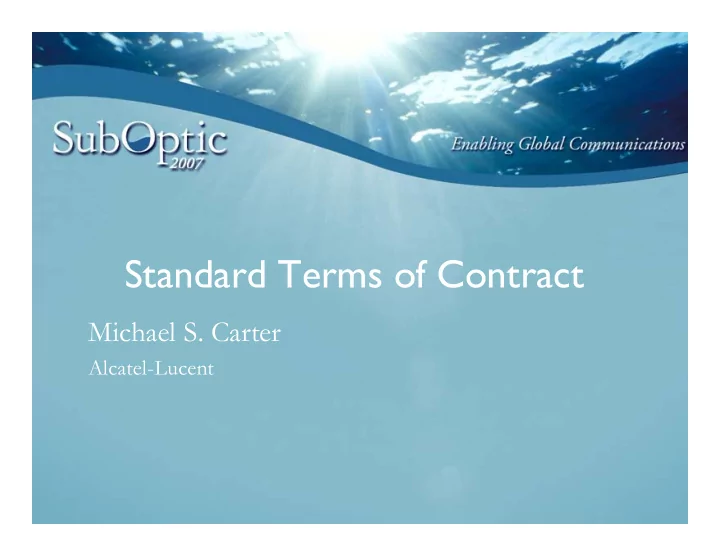

Standard Terms of Contract Michael S. Carter Alcatel-Lucent
Presenter Profile Before joining ASN in 2000, Michael was international counsel for Alcatel Italia (1997-2000) and Alcatel Place in Paris (1995-97). He practiced law picture here with Mudge Rose Guthrie Alexander & Ferdon in Paris (1989-95) and Rogers & Wells in New York (1986- 89). He is a graduate of Bowdoin Michael S. Carter College and Columbia University General Counsel School of Law. michael.carter@alcatel- lucent.fr +33 1 30 77 68 39
Introduction Most commercial contracts in the submarine telecommunications industry are of a few recurring types: � turnkey system supply � system upgrades � marine maintenance services � terrestrial operation & maintenance services
Introduction (continued) Objectives/expectations of suppliers, service providers and customers are broadly the same. Little variation in subject matter covered. Yet no industry industry standard exists.
Competitive Bidding RFQ includes form of contract � Statement of compliance – “compliant” v. “non-compliant” – no comments if “compliant” – incentive to limit “non-compliant” answers – comments short, reasoning not always obvious – “partly compliant” or “compliant, except for …” – comments even if “compliant” – proposed new clauses � Bid-clarification meetings & BAFO rounds
Direct Negotiations Starting point usually drafter’s model contract. � Varies from one transaction to another. � May be unfamiliar to other party. Negotiating sessions. � Goal is fair & balanced contract. � Process can be time-consuming, costly & difficult. – Sessions can last hours or days. – Significant costs if outside counsel involved. – Arduous if opening draft perceived as one-sided.
Contract as Legal Framework Parties’ objectives/expectations: � Equipment/services per specs. & delivered on time. � Agreed price paid on time. Legal framework for commercial relationship: � Rights & obligations. � Risks & responsibilities. � O pportunity for standardization.
Drawbacks of Current Practice Comparison of technical merits & prices. Comparison of proposed contractual terms. Risk assessment reflected in pricing. Lengthy adjudication processes or negotiations consume resources & increase time to market.
Advantages of Industry Standard Use of a recognized standard set of terms for recurring types of contracts in our industry would afford significant advantages: � level playing field in competitive bidding � simplified risk assessment � legal certainty � faster, easier contractual negotiations � improved time to market for customers
Models for Comparison Standardized contracts for the construction industry are offered by: � American Institute of Architects � Institution of Civil Engineers � Joint Contracts Tribunal Ltd � International Federation of Consulting Engineers BIMCO develops model maritime contracts & other related forms, such as charter parties & other shipping documents.
Conclusion The submarine telecommunications industry could like likewise benefit from acceptance of a recognized standard set of fair & balanced contractual terms for recurring types of contracts. SubOptic might serve as a possible forum for the development of such a standard for the industry.
Recommend
More recommend